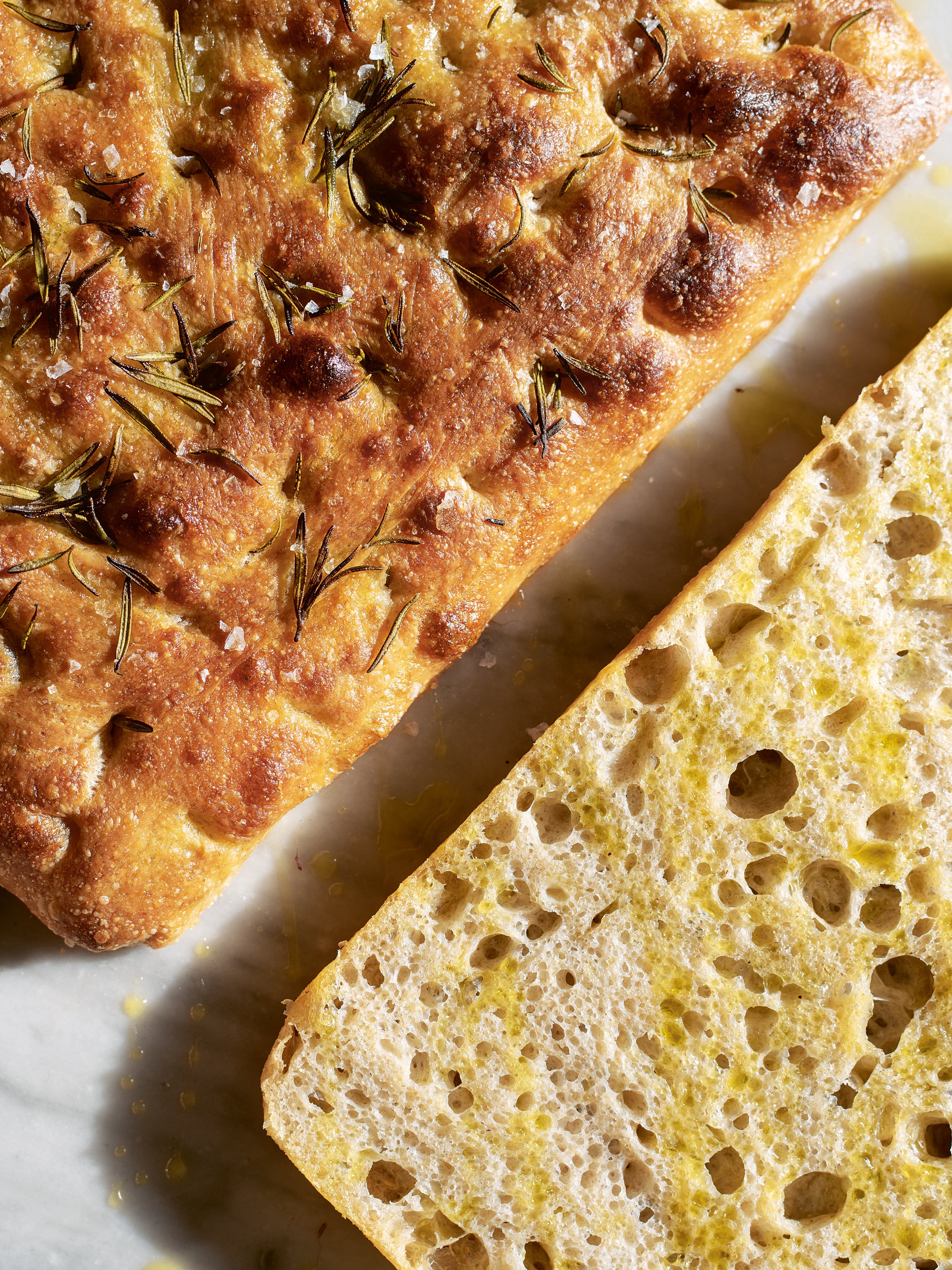Wholemeal focaccia recipe: A sourdough take on the Italian classic
This sourdough recipe uses a wholemeal starter to create the Italian bread, writes Katie Wright

Scattered with sea salt, rosemary and a drizzle of olive oil, this focaccia integrale (which means wholemeal) is a sourdough version of the Italian classic.
Focaccia integrale recipe
Makes 1 large focaccia
Ingredients
150g rye or wholemeal (wholewheat) sourdough starter
425g strong white flour
8g table salt
350g tepid-warm water (see method)
100g good-quality extra virgin olive oil, plus extra for oiling and drizzling
2-3tsp good-quality sea salt flakes
Herbs or toppings as you see fit (I like a handful of olives, a few tomatoes on the vine, a sliced red onion or a sprig or two of rosemary)
Method
1. Ideally, take your starter out of the fridge at least eight to 14 hours before you want to bake. If it hasn’t been fed recently, give it a feed when you take it out. You can use it straight from the fridge, but your first prove will take quite a bit longer. In a large bowl, weigh your flour. Add the table salt, then mix this in using your fingers. Add in your sourdough starter.
Read more:
2. Mix some warm and cool water in a jug to 25ºC (77ºF), then weigh out 350g and pour this into your bowl. Mix everything roughly until you have a very wet dough. Let the dough rest for about 20–30 minutes – even allowing for a short autolyse of 10 minutes makes a difference. Cover the bowl with a damp tea towel or a plate to stop the dough drying out during this time.
3. Knead your dough – for this dough (which is very wet), stretching and folding intermittently works very well, but I’d still give it a little bit of working before adding the oil. The slap and fold method also works well. Give it five minutes of mixing, and as soon as it feels smooth, add your oil. Mix this until completely combined and you’ve got a very soft, shiny dough. Wrap your bowl in a couple of large tea towels to keep it warm and stop the dough drying out. Leave in a relatively warm place for about four hours.
Alternatively, you could retard this prove overnight in a cool place, covering the dough with a plastic bag. I would do a stretch and fold following this, if so, then leave it in a warm place for one hour before shaping.
4. This dough should appear large and slightly terrifying, with loads of big bubbles. If it isn’t, leave it a little longer. Once it is, oil a roasting tin and then add a little oil on top of your proven dough. Your hands should be very oily, too. Use your hands or a dough scraper to scrape your dough out of the bowl and into the tin. If it sticks, don’t worry – you can lift it off with your scraper and then add more oil.
5. Flatten your dough slightly, being careful to maintain its delicate air bubbles. Fold your dough in half, and then fold your new, longer dough in half again. I think of this like folding an A4 (US letter) piece of paper twice so that you’ve got a smaller piece of paper. Add more oil if it’s sticking, and gently push your dough out into the corners of a 30 x 40cm (12 x 16in) roasting tin. Stick your tin inside a plastic bag and leave to prove for two to three more hours at room temperature.
Alternatively, you can retard this prove overnight or for up to 24 hours until your bread is ready to bake. You want it to grow further by about half.
Read more:
6. Preheat your oven to 250ºC (480ºF)/230ºC (450ºF) fan/Gas 9 at least 30–40 minutes before you expect to bake your bread. If you have a stone, place it in the oven to heat up. Just before it’s ready to bake, remove the focaccia from the plastic bag and poke indentations using oiled fingers in the dough, giving the focaccia its characteristic holes. Top with some flakedsea salt, at least, and any olives, vegetables or herbs you like. Drench the whole thing with generous drizzles of oil.
7. Place in the oven and add steam using your chosen method – for example, adding some water into a cast-iron pan that’s sitting in the bottom of the oven. Turn the oven down to 220ºC (430ºF)/200ºC (400ºF) fan/Gas 7. Bake for 20 minutes, and then vent the oven by opening the door and allowing the steam to escape. Bake for another 15–20 minutes, or until a good golden brown.
8. Leave to cool for at least 15 minutes. Then add more oil on top. Slice and serve hot if you like, but it does also keep extremely well. Just add more oil when you serve it.
‘Sourdough From Scratch’ by James Morton photography by Andy Sewell, is published by Quadrille, priced £12.